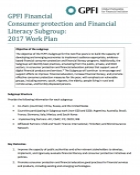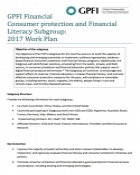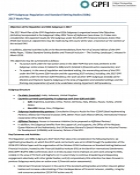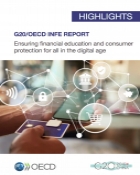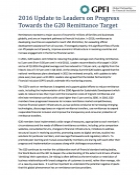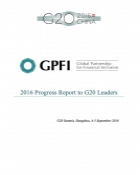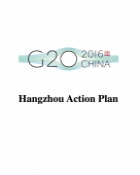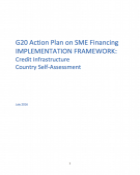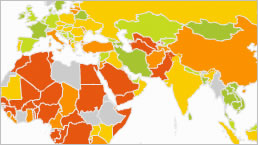| Apr 20, 2017
This is the 2017 Work Plan for the GPFI Financial Consumer Protection and Financial Literacy Subgroup.The objective of the FCPFL Subgroup for the next five years is to build the capacity of developing and emerging economies to implement audience-appropriate, evidence-based financial consumer protection and financial literacy programs. Additionally, the Subgroup will identify best practices, emanating from the public, private, and NGO sectors, in consumer protection and financial education policies that support use of digital financial products and services. The Subgroup will continue its efforts, consistent with the G20’s 2013 St. Petersburg Development Outlook, to increase incentives, financial education, financial literacy, and consumer protection for the poor, with emphasis on
| Apr 20, 2017
This is the 2017 Work Plan for the GPFI SME Finance Subgroup.Consistent with the theme of Germany's G20 Presidency in 2017, "Shaping an interconnected world", the GPFI SME Finance Subgroup will work on the implementation of the following priorities in 2017:Review and update of the G20 Financial Inclusion Action Plan;Roll out of the G20 Implementation Framework on SME financing;Financial Services for SMEs in Sustainable Global Value Chains;Climate smart financing for rural MSMEs - enabling policy frameworks;Implementation of the High Level Principles for Digital Financial Inclusion: Alternative Data and SME Finance; andData Harmonisation.The Subgroup will also continue to work on its continued working agenda under the former Presidencies’ specifically on the following themes: innovation -
| Apr 20, 2017
This is the 2017 Work Plan of the GPFI Regulation and Standard-Setting Bodies (SSBs) Subgroup.The Subgroup's Work Plan is organized around the Objectives (Activities) and Sub-objectives included in the Subgroup’s May 2014 Terms of Reference. It takes into consideration also the expected results under the GPFI Financial Inclusion Action Plan (FIAP) and the related indicators in the results framework included in the Subgroup’s Terms of Reference. In addition, reference is made throughout to the numbered Recommendations from Part VI of second edition of the GPFI White Paper Global Standard-Setting Bodes and Financial Inclusion: The Evolving Landscape.
Report | Feb 9, 2017
Guided by the three pillars of the German G20 Presidency in 2017: building resilience; improving sustainability; and assuming responsibility, the GPFI will develop ongoing processes further and will support the implementation of the G20 Financial Inclusion Action Plan. Important priority areas are:Review and Update of the Financial Inclusion Action Plan: 2030 Agenda and DigitisationImplementation of the High Level Principles for Digital Financial Inclusion: Opportunities and Risks of Digital Financial InclusionImplementation of the G20 Action Plan on SME FinancingFinancial Inclusion of Vulnerable Groups: Forcibly Displaced PersonsCross-cutting issues will be taken into account and there will be a special focus, as far as inclusion is concerned, on gender, youth, poor people and rural areas
Report | Sep 16, 2016
This document contains an outcome-based core competencies framework on financial literacy for adults, developed by the OECD International Network on Financial Education (OECD/INFE) in response to a call from G20 Leaders in 2013. This report highlights a range of financial literacy outcomes that may be considered to be universally relevant and important to sustain or improve financial wellbeing in everyday life.
Report | Sep 16, 2016
Based on an overview of worldwide trends in the development of digital financial services, this OECD International Network on Financial Education (OECD/INFE) report highlights the use and potential of digital tools to achieve higher levels of financial wellbeing and identifies policy challenges and solutions for enhancing financial consumer protection and education frameworks.
Report | Nov 28, 2017
Remittances represent a major source of income for millions of families and businesses globally, and are an important pathway to financial inclusion. This report outlines G20 measures and progress to expand responsible financial inclusion and improve the transparency and consumer protection of remittance transfers.Learn more about the G20 National Remittance Plans.
Report | Sep 13, 2016
This report summarizes GPFI activities from December 2015 to July 2016, presents the main achievements under the Chinese Presidency and describes the outlook for the rest of 2016 and into the start of the German Presidency. References to all relevant documentation produced by the different workstreams are provided at the end of this report.
Report | Sep 13, 2016
The Hangzhou Action Plan explicitly recognizes the critical importance of financial inclusion to empowering the lives of the poor. Based on the G20 High-level Principles for Digital Financial Inclusion, G20 Leaders commit to taking “concrete actions” recommended by the Global Partnership for Financial Inclusion (GPFI) to promote digital financial inclusion, and help low-income developing countries (LIDCs) to reach the “last mile” of excluded and underserved groups.In addition, G20 Leaders welcomed “the first country self-assessment about to take place within the G20 Action Plan on SME Financing Implementation Framework”, and supported “the continued work of the GPFI to implement the G20 Financial Inclusion Action Plan (FIAP) and ask the GPFI to review the FIAP in 2017”. The Hangzhou Action
Report | Sep 16, 2016
Small and medium-sized enterprises (SMEs) play a crucial role for employment, job creation, investment, innovation and economic growth around the world. They account for about 90% of businesses and more than 50% of employment worldwide, and are therefore crucial for the recovery of the world’s economy. Considering this important role, it is critical to ensure that viable SMEs around the world have access to the credit they need to expand.
Lack of a sound credit infrastructure is one of the major problems in the credit market for SMEs. Having a solid credit infrastructure will help countries reduce the information asymmetries and legal uncertainties that increase risk to lenders and constrain the supply of finance to SMEs.
By endorsing the G20 Action Plan on SME Financing in 2015, the


